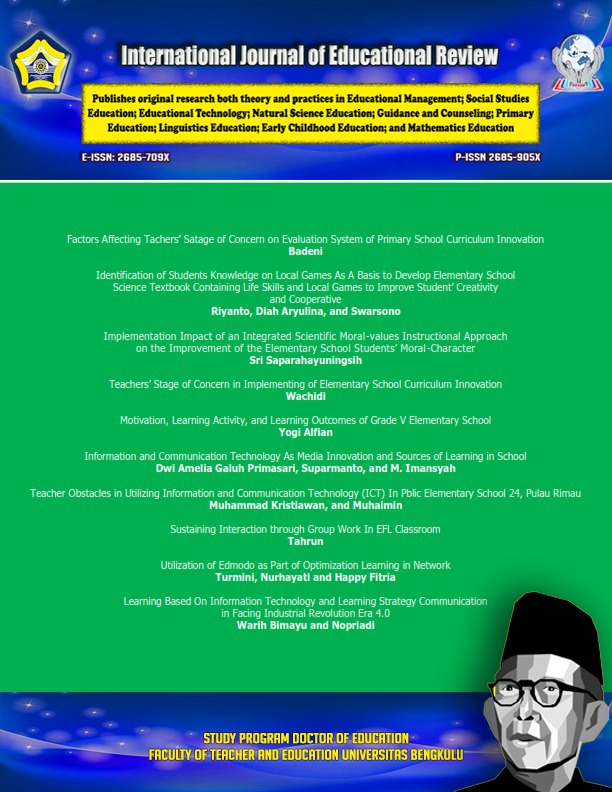Quality Education and the Use of English Language as a Medium of Instruction in Rwandan Schools: An Interpretivist Study
DOI:
https://doi.org/10.33369/ijer.v4i1.21426Keywords:
English language, English as a medium of instruction, educational quality, RwandaAbstract
The purpose of the study upon which this paper is based was to investigate the level at which school leaders and teachers use English as a medium of instruction to promote quality education in their schools. Data were collected using questionnaires, interviews, and classroom observations at a Twelve-Year Basic Education school located in Muhanga District in the Southern Province of Rwanda. Participants consisted of two school leaders and 18 teachers from the school. Results suggest that teachers use the English language at minimal level during classroom activities. Pedagogical implications regarding what could be done to effectively use the English language in classrooms in order to foster quality education will be discussed.References
Choi Fung Tam, A. (2012). Language and Education. Does the switch of medium of instruction facilitate the language learning of students? The Chinese University of Hong Kong, Shatin.
Devine,T. (2000). English for autonomy, autonomy in English: students’ and teachers’ beliefs about autonomy in language learning. Proceedings of the 13th Annual EA Education conference,67-77.
Habyarimana, H. (2015). Investigation of attitudes and classroom practices of educators and learners in relation to English as the medium of instruction at four primary schools. PhD thesis, University of the Witwatersrand, Johannesburg.
Jana ,M. (n.d ). Overgeneralisation in learning to read. University of Illinois.
Khaled ,K. (n.d). First language (L1) influence on second language (L2) reading: the role of transfer. Department of Curriculum and Instruction. Faculty of Education. University of Victoria, B.C.
Khasbani,I. (2019). English as a medium of Instruction in Indonesian primary and secondary Education: Theory and reality. Englisia Journal 6(2),146.https://doi.org/10.22373/ej.v6i2.4506.
Kozhevnikova, E. (2019). Impact of language exposure and artificial linguistic environment on students vocabulary acquisition. Institute of foreign languages, peoples’ friendship University of Russia.Doi:http://doi.org/10.20319/pijss.2019.51.430439
Krashen, S. (1987). Principles and practice in second language acquisition. Prentice-Hall International.
Krashen, S. (1988). Second language acquisition and language learning. Prentice-Hall International.
Krashen, S. (2013). Second language acquisition: Theory, applications, and some conjectures. Cambidge University Press.
Marsh ,D. (2006) English as medium of instruction in the new global linguistics order :Global characteristics, local consequences. UNICOM, continuing Education, Centre, University of Jyvaskyla.
Maslow, A. (1996). Critique of self-actualisation theory: In E. Hoffman(ed.). Future visions: The unpublished papers of Abraham Maslow. Thousand Oaks,CA:sage.pp.26-32.
Nzabarirwa,W.(2016). Education quality in Rwanda: factors of success, challenges and future prospects. Catholic Education in Rwanda
O’Dwyer, S. (2006).The English teacher as facilitator and authority. David English House, Hiroshima prefecture, Japan School of philosophy, University of New South Wales. Volume 9, number 4.
Popham, J. (2006). Educational leadership magazine. Los Angeles.
Schoemaker, P. (2011). Brilliant mistakes: Finding success on the far side of failure. Philadelphia: Wharton digital place.
Sivasubramaniam Sivakumar, (2009). Issues and Insights for promoting Agency, Voice and Subjecthood in Reading and Assessment. The Petroleum Institute, Abu Dhabi.
Uwambayinema ,E.(2013). Science Teachers’challenges implementing Rwanda ‘s English as a medium of instruction policy .Masters thesis. College of Arts and Humanities, California State University, Fresco.
White, L. (1989). Universal Grammar and second language acquisition. Volume 1. Amsterdam: John Benjamins.
Youssif Zaghwani, O. (2019). Influence of Grammar Translation method(GTM) on Libyan students’ English performance in communicative situations. Department of English, Faculty of Arts, University of Benghazi. International Journal of Social Sciences.Vol5 no 2. Doi:https:doi.org/10.20319/pijss.2019.52.511530.
Downloads
Published
How to Cite
Issue
Section
License

This work is licensed under a Creative Commons Attribution-ShareAlike 4.0 International License.



